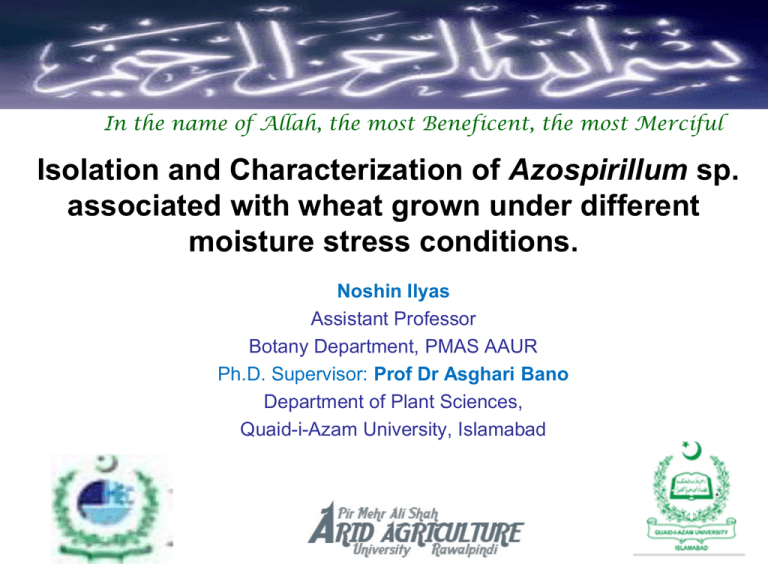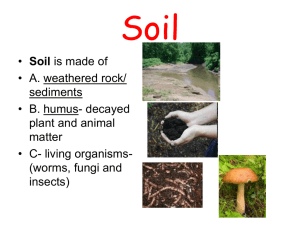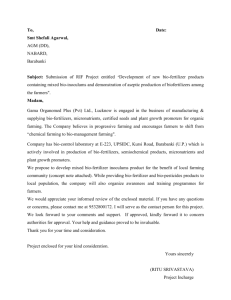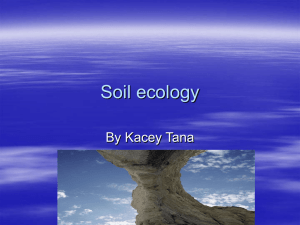by the Azospirillum strains isolated from rhizosphere soil and roots
advertisement

In the name of Allah, the most Beneficent, the most Merciful Isolation and Characterization of Azospirillum sp. associated with wheat grown under different moisture stress conditions. Noshin Ilyas Assistant Professor Botany Department, PMAS AAUR Ph.D. Supervisor: Prof Dr Asghari Bano Department of Plant Sciences, Quaid-i-Azam University, Islamabad Soil Sustainable Agriculture Plant Microbes Microbes ……. Play important role in the terrestrial ecosystem Soil fertility Wheat Facts in Pakistan • • • Area: 8.2 million hectares Production: 22.0 million tons Average grain yield: 2.5 tons/ha. • • • Dependence of 80 percent of the farmers 40 percent of the cropped area, Contribute a quarter of the total crop sector value added Azospirillum Azospirillum are nitrogenfixing bacteria that live in a symbiotic relationship in the root cortex of several tropical crops. Stress ?????? An Environmental change that tends to inhibit the normal cycle systems from functioning Stresses may be Biotic Pests Diseases Abiotic Water stress Salinity Soil nitrate Temperature Heavy metals Biocides Situation in Pakistan Out of total geographical area of Pakistan more than 70% (87.81million ha) is arid or semi arid Salt-Affected Soils OBJECTIVES Present investigation was aimed: 1) To isolate and characterize Azospirillum strains isolated from different agroecological zones having different moisture regimes 2) To determine the genotype differences in the Azospirillum strains isolated and to evaluate the phytohormones production of strains isolated 3) To select the strains which can be successfully used as inoculant of wheat exposed to water stress. Plan of Research Isolation and biochemical characterization of efficient strains of Azospirillum from rhizosphere and roots of wheat from semi-arid area of Attock (8% available soil moisture) and Kallar Sayedan (14% available soil moisture) and irrigated National Agricultural Research Center (25% available soil moisture). Isolation and biochemical characterization of efficient strains of Azospirillum isolates from plants of isolated from roots and rhizosphere soils of plants grown under well watered (soil moisture 22 %) conditions and water stressed ( 8 % soil moisture) conditions in pots. Stages of crops at which sampling was done: Tillering Anthesis Methodology Survival efficiency (CFU) Biochemical Techniques QTS (Quick Test system) tests Phytohormones production Molecular Techniques: RAPD (Random Amplification of Polymorphic DNA) 16srRNA Gene amplification Reinocualtion studies Isolates of Azospirillum obtained from rhizospheric soil and roots of Wheat plants collected from water stressed and well watered conditions. AZOSPIRILLUM From Roots From Rhizosphere Irrigated Area NARC (Tillering stage) WRA1 WSA1 Attock (Tillering stage) WRA2 WSA2 Kallar Sayedan (Tillering stage) WRA3 WSA3 Irrigated Area NARC (Anthesis stage) WRA4 WSA4 Attock (Anthesis stage) WRA5 WSA5 Kallar Sayedan (Anthesis stage) WRA6 WSA6 Well watered pot conditions (Tillering stage) WRA7 WSA7 Water Stressed pot conditions (Tillering stage) WRA8 WSA8 Well watered pot conditions (Anthesis stage) WRA9 WSA9 Water stressed pot conditions (Anthesis stage) WRA10 WSA10 5 a 4.5 a b a b b b a 4 c c b c b c 3.5 d c d d f Log cfu/g 3 d 2.5 2 1.5 1 0.5 Tillering stage Anthesis WSA10 WRA10 WSA9 WRA9 WSA6 WRA6 WSA5 WRA5 WSA4 WRA4 WSA8 WRA8 WSA7 WRA7 WSA3 WRA3 WSA2 WRA2 WSA1 WRA1 0 stage Azospirillum isolated from wheat Colony forming unit (cfu/g) of Azospirillum strains isolated from rhizosphere soil and roots of wheat grown in field and in pots. The rhizosphere soil was collected at a depth of 15 cm from soil surface under arid (soil moisture 8 %), semiarid (soil moisture 14 %) and irrigated (soil moisture 25 %) conditions and from water stressed (soil moisture 8 %) and well watered pot (soil moisture 22 %) conditions. QTS (Quick Test system) Morphological and biochemical characteristics (as determined by QTS) of Azospirillum strains isolated from rhizosphere soil and roots of field wheat grown. The rhizosphere soil was collected (at a depth of 15 cm from soil surface) from soil surface under arid (soil moisture 8 %), semiarid (soil moisture 14 %) and irrigated (soil moisture 25 %) conditions. Tests Isolates Reactions Colony Morphology OPNG CIT MALO LDC ADH ODC H2S URE TDA Group I WRA1,WSA1, WRA4,WSA4 Irregular, wrinkled, pink Group II WRA3,WSA3, WRA6,WSA6 Irregular, wrinkled, pink Group III WRA2,WSA2, WRA5,WSA5 Irregular, wrinkled, pink Gram Stain - - - Catalse and Oxidase + + + Ortho nitro phenyl β-D-galactopyranoside Sodium citrate Sodium malonate Lysine decarboxylase Arginine dihydrolase Orthinine decarboxylase H2S production Urea hydrolysis Tryptophane deaminase Indole + + + + + + - + + + + + - + + + + + - + + + + + + + + Azospirillum brasilense - VP VogerProskaur(Acetion) GEL Gelatin hydrolysis GLU Acid from glucose MAL Acid from maltose SUC Acid from sucrose MAN Acid from mannitol ARA Acid from arabinose RHA Acid from rhammose SOR Acid from sorbitol INO Acid from inositol ADON Acid from adontol MEL Acid from melibiose RAF Acid from raffinose Organism identified Morphological and biochemical characteristics (as determined by QTS) of Azospirillum strains isolated from rhizosphere soil was collected and roots of pot grown wheat. The rhizosphere soil was collected (at a depth of 15 cm from soil surface) from wheat grown in water stressed (soil moisture 12 and 8 %) and well watered pot conditions (soil moisture 22 %) conditions. Tests Isolates Reactions Colony Morphology Group I WRA7, WSA7, WRA9, WSA9 Group II WRA8, WSR8 Group III WRA10, WSA10 Irregular, wrinkled, pink Irregular, wrinkled, pink Gram Stain - - Irregular, wrinkled, pink - Catalse and Oxidase + + + OPNG Ortho nitro phenyl β-D-galactopyranoside + + + CIT MALO LDC ADH ODC Sodium citrate Sodium malonate Lysine decarboxylase Arginine dihydrolase Orthinine decarboxylase + + + - + + + - + + + - H2S URE TDA H2S production Urea hydrolysis Tryptophane deaminase + + + - + - Indole - - - VP VogerProskaur(Acetion) - - - GEL GLU MAL SUC MAN ARA RHA SOR INO ADON MEL RAF Organism identified Gelatin hydrolysis Acid from glucose Acid from maltose Acid from sucrose Acid from mannitol Acid from arabinose Acid from rhammose Acid from sorbitol Acid from inositol Acid from adontol Acid from melibiose Acid from raffinose + + + + + + + + Azospirillum brasilense - Without Tryptophan 60 50 a a a a b a (µg/100 ml) 40 bc a 30 b b ab b b b c d c a 20 d b d c c WRA2 WSA2 cd c cb a b c bc c a a d d e b d b c c WRA5 WSA5 d cb cb e 10 0 WRA1 WSA1 WRA3 WSA3 WRA4 WSA4 WRA6 WSA6 Azospirillum isolates from Wheat field study Phytohormone production (µg/100ml) by the Azospirillum strains isolated from rhizosphere soil and roots of wheat grown in field without tryptophan. The rhizosphere soil (collected at a depth of 15 cm from soil surface) was sampled under arid (soil moisture 8 %), semiarid (soil moisture 14 %) and irrigated field (soil moisture 25 %) conditions IAA GA ABA Zeatin With Tryptophan 700 600 (µg/100ml) 500 a b a a b b a b d d 400 a b b c c c c e c e d d 300 a c ea e e a 200 b b e 100 c c c f d d e d c c c e e WRA5 WSA5 b b d 0 WRA1 WSA1 WRA2 WSA2 WRA3 WSA3 WRA4 WSA4 WRA6 WSA6 Azospirillum isolates from Wheat field study Phytohormone production (µg/100ml) by the Azospirillum strains isolated from rhizosphere soil and roots of wheat grown in field with tryptophan. The rhizosphere soil (collected at a depth of 15 cm from soil surface) was sampled under arid (soil moisture 8 %), semiarid (soil moisture 14 %) and irrigated field (soil moisture 25 %) conditions IAA GA ABA Zeatin Without Tryptophan 50 a 45 a b 40 a a (µg/100ml) 35 b b ab b c b b b c IAA GA ABA Zeatin a b c 20 15 b a a a 30 25 a a a b b c c c b b b 10 5 0 WRA7 WSA7 WRA8 WSA8 WRA9 WSA9 WRA10 WSA10 Azospirillum isolates from Wheat pot study Phytohormone production (µg/100ml) by the Azospirillum strains isolated from rhizosphere soil and roots of wheat grown in pots without tryptophan. The rhizosphere soil (collected at a depth of 15 cm from soil surface) was sampled under water stressed (soil moisture 8 %) and well watered pot (soil moisture 22 %) conditions. With Tryptophan 700 600 500 aa b aa b b a c 400 a a a b (µg/100ml) c c IAA a c a b 300 c GA b c 200 b b c c WRA8 WSA8 WRA9 WSA9 WRA10 Azospirillum isolates from Wheat pot study WSA10 c 100 c c b c c 0 WRA7 WSA7 Phytohormone production (µg/100ml) by the Azospirillum strains isolated from rhizosphere soil and roots of wheat grown in pots with tryptophan. The rhizosphere soil (collected at a depth of 15 cm from soil surface) was sampled under water stressed (soil moisture 8 %) and well watered pot (soil moisture 22 %) conditions. Reinoculation studies Effect of the inoculation of Triticum aestivum L with field isolated Azospirillum. Treatments Shoot Length (cm) Root Length (cm) Shoot Dry Weight(g) Root Dry Weight(g) T0 Root to shoot ratio 0.61 23e 17.5f 0.57b 0.45f T1 1.7 17f 27.8d 0.22d 0.88g T2 0.83 30a 26.3e 0.88a 0.57d T3 2.6 24.7d 42.5a 0.49c 1.4b T4 1.32 28.5b 31.8c 0.72b 0.7c T5 3.65 26.5c 36.4b 0.53c 1.3a Plants were harvested 45 days after sowing.T 0 not inoculated and kept well watered; T1 not inoculated and exposed to induced water stress for 7 d; T2 inoculated with Azospirillum isolated from irrigated field and kept well watered; T 3 inoculated with Azospirillum isolated from irrigated field and exposed to water stress for 7 d; T 4 inoculated with Azospirillum isolated from arid field and kept well watered; T5 inoculated with Azospirillum isolated from arid field and exposed to water stress for 7 d. Effect of the inoculation of Triticum aestivum L with pot isolated Azospirillum. Treatments Shoot Length (cm) Root Length (cm) Shoot Dry Weight(g) Root Dry Weight(g) Root to shoot ratio T0 22.5e 18f 0.6c 0.46f 0.71 T1 18f 26.2d 0.54d 0.9d 1.6 T2 31a 28.3e 0.9a 0.79e 0.83 T3 23.9d 44.5a 0.51e 1.45b 2.7 T4 29.2b 32.6c 0.75b 0.93c 1.32 T5 27c 37.1b 0.55d 1.88a 3.65 Plants were harvested 45 days after sowing T0; not inoculated and kept well watered;T1;not inoculated and exposed to induced water stress for 7 d; T2 inoculated with Azospirillum isolated from well watered potted plants and kept well watered; T3 inoculated with Azospirillum isolated from well watered potted plants and exposed to water stress for 7 d; T4 inoculated with Azospirillum isolated from potted plants under induced water stressed conditions and kept well watered; T5 inoculated with Azospirillum isolated from potted plants under induced water stressed and exposed to water stress for 7 d. UPGMA Analysis of RAPD banding patterns by OP-01 primer of Azospirillum strains isolated from rhizosphere soil and roots of wheat grown under arid (soil moisture 8 %), semiarid (soil moisture 14 %) and irrigated (soil moisture 25 %) conditions. UPGMA Analysis of RAPD banding patterns by OP-06 primer of Azospirillum strains isolated from rhizosphere soil and roots of wheat grown under arid (soil moisture 8 %), semiarid (soil moisture 14 %) and irrigated (soil moisture 25 %) conditions UPGMA Analysis of RAPD banding patterns by OP-01 primer of Azospirillum strains isolated from rhizosphere soil and roots of wheat plants grown in water stressed (soil moisture 12 and 8 %) and well watered pot conditions (soil moisture 22 %) conditions. UPGMA Analysis of RAPD banding patterns by OP-06 primer of Azospirillum strains isolated from rhizosphere soil and roots of wheat plants grown in water stressed (soil moisture 12 and 8 %) and well watered pot conditions (soil moisture 22 %) conditions. PCR product of 16S rRNA gene of Azospirillum strains isolated from rhizosphere soil and roots of wheat grown under arid (soil moisture 8 %), semiarid (soil moisture 14 %) and irrigated (soil moisture 25 %) conditions Lane M=1kb DNA ladder; Lane1: Azospirillum isolate from roots of plants growing at NARC collected at tillering stage; Lane 2: Azospirillum isolate from Rhizosphere Soil of plants growing at NARC at tillering stage; Lane 3: Azospirillum isolate from roots of plants growing at Attock at tillering stage; Lane 4: Azospirillum isolate from Rhizosphere Soil of plants growing at Attock at tillering stage; Lane 5: Azospirillum isolate from roots of plants collected from Kallar Sayedan at tillering stage; Lane 6: Azospirillum isolate from rhizospheric soil of plants growing at Kallar Sayedan at tillering stage; Lane 7: Azospirillum isolate from roots of plants growing at NARC collected at anthesis stage; Lane 8: Azospirillum isolate from Rhizosphere Soil of plants growing at NARC at anthesis stage; Lane 9: Azospirillum isolate from roots of plants growing at Attock at anthesis stage; Lane 10: Azospirillum isolate from Rhizosphere Soil of plants growing at Attock Lane 11: Azospirillum isolate from roots of plants collected from Kallar Sayedan at anthesis stage Lane 12: Azospirillum isolate from rhizospheric soil of plants growing at Kallar Sayedan at anthesis stage. PCR product of 16S rRNA gene of Azospirillum isolates, from rhizospheric soil and roots of wheat plants collected from water stressed conditions (soil moisture 12 and 8%) and well watered conditions (soil moisture 22%) Lane M=1kb DNA ladder; Lane1: Azospirillum isolates from roots of plants collected from pot study growing under well watered conditions at tillering stage; Lane2: Azospirillum isolates from rhizospheric soil of plants collected from pot study growing under well watered conditions at tillering stage; Lane3: Azospirillum isolates from roots of plants collected from pot study growing under water stressed conditions at tillering stage; Lane 4: Azospirillum isolates from rhizospheric soil of plants collected from pot study growing under water stressed conditions at tillering stage; Lane 5: Azospirillum isolates from roots of plants collected from pot study growing under well watered conditions at reproductive stage; Lane 6: Azospirillum isolates from rhizospheric soil of plants collected from pot study growing under well watered conditions at reproductive stage; Lane 7: Azospirillum isolates from roots of plants collected from pot study growing under water stressed conditions at reproductive stage; Lane 8: Azospirillum isolates from rhizospheric soil of plants collected from pot study growing under water stressed conditions at reproductive stage. 16S rRNA Sequencing • On the basis of phytohormone production and tolerance to water stress, WRA5 Azospirillum (isolated from rhizosphere soil of wheat plants grown in arid field at anthesis stage) and WRA10 Azospirillum (isolated from roots of wheat plants growing under induced water stress conditions in potted plants at anthesis stage) were characterized by 16S rRNA gene sequence analysis. Sequences were compared with standard databases by BLAST (NCBI) software and deposited at NCBI databank (with accession No.GQ144644 for WRA5, and for WRA10 accession No. GQ144646). Conclusions The present investigation has confirmed that association of microbes depends on developmental stage and root architecture of plants. • Azospirillum spp. isolated from moisture stressed conditions either from field or pot improved tolerance to water stress and thus they can be used as inocula to promote plant growth on stressed sites, such as semiarid and arid regions. • The isolates from water unstressed conditions had less production of IAA, GA and t-zr than isolates from water stressed/arid field area but have higher ABA/t-zr ratio. •Azospirillum isolates WSA5 and WRA10 (strains isolated at the anthesis stage from rhizosphere soil of wheat plants grown in arid field and from roots of wheat plants growing under water stress conditions in potted plants) were the most efficient and had higher ABA/trans zeatin riboside ratio (ABA is the phytohormones which gives tolerance to plant under water stress and thus can be used as biofertilizers in arid and semi-arid conditions. Future perspectives and Recommendations Efficiency of these isolates may be tested under field conditions. Rhizobium and Azospirillum spp. isolated from moisture stressed conditions / arid region have potential for increased tolerance to water stress if used as an inoculum to promote plant growth on stressed sites particularly semiarid and arid regions of Pakistan.







